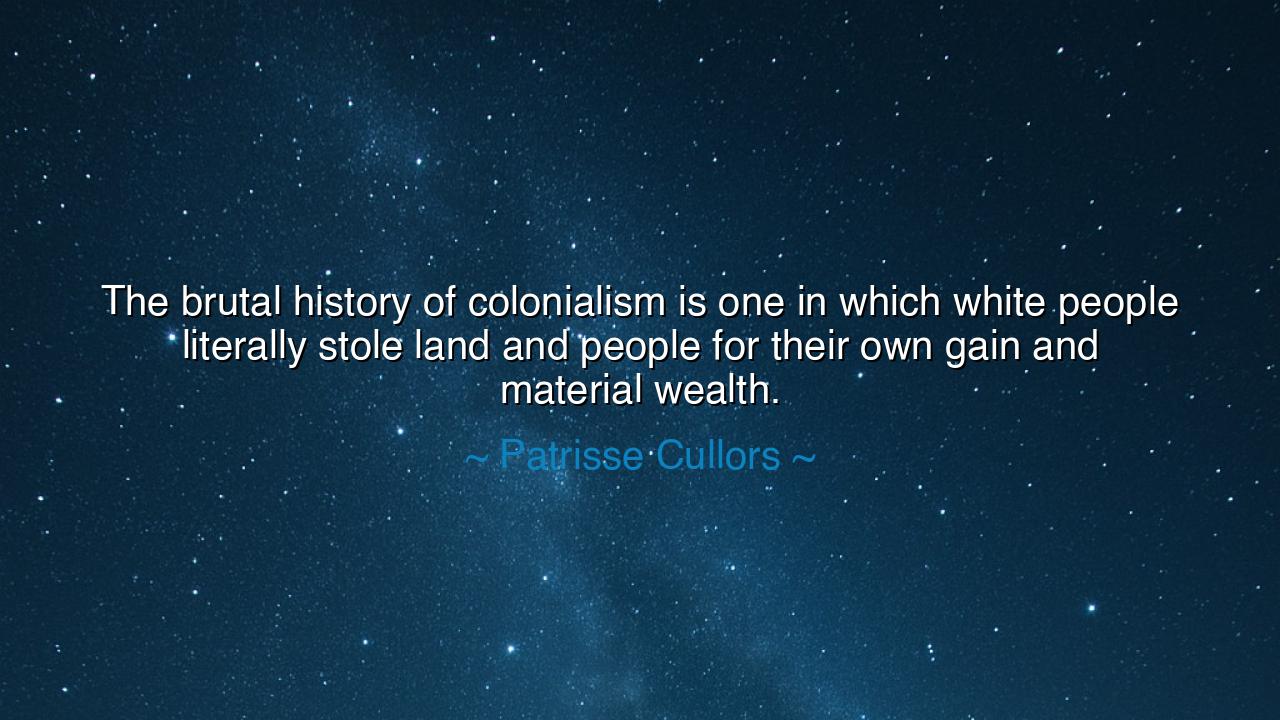
The brutal history of colonialism is one in which white people
The brutal history of colonialism is one in which white people literally stole land and people for their own gain and material wealth.






Hearken, O children of the world, and attend the words of Patrisse Cullors, who spoke with the clarity of one who confronts the unvarnished truths of human history: “The brutal history of colonialism is one in which white people literally stole land and people for their own gain and material wealth.” In these words lies a meditation upon injustice, greed, and the enduring scars left by the conquest of nations and the subjugation of peoples. Cullors reminds us that history is not a distant tale, but a living memory that shapes societies, ethics, and the quest for justice.
Colonialism, she teaches, is not merely a political or economic system, but a moral wound inflicted upon humanity. Across centuries, peoples were uprooted, lands seized, and cultures suppressed for the gain of distant powers, leaving generations to wrestle with loss, displacement, and humiliation. This history is brutal because it disregarded the sanctity of human life, treating both people and land as instruments for material accumulation, rather than as embodiments of dignity and belonging.
Consider the transatlantic slave trade, which forcibly removed millions of Africans from their homelands to labor in the plantations of the Americas. Families were torn asunder, languages and traditions disrupted, and entire societies were transformed by violence and exploitation. Cullors’ words remind us that this was not incidental or accidental—it was deliberate, systematic, and rooted in a pursuit of wealth and power at the expense of human lives. The echoes of these acts persist across generations, shaping contemporary social, economic, and cultural landscapes.
The history of colonialism extends beyond slavery. In North America, Indigenous peoples were displaced, their lands seized, their communities decimated through war, disease, and forced assimilation. The theft of land and resources was sanctioned by laws and ideologies that justified domination, illustrating that colonialism was both an economic enterprise and a moral transgression. Cullors emphasizes that understanding this history requires acknowledgment of its cruelty, its systemic nature, and its long-lasting consequences.
Yet within this reckoning lies a call to awareness and action. By confronting the truth of colonialism, societies can begin to grapple with reparations, reconciliation, and the dismantling of persistent inequalities. Recognizing the historical theft of land and people is not a gesture of blame alone, but a step toward justice, healing, and accountability. The lessons of the past illuminate the moral responsibilities of the present.
Consider the Haitian Revolution, where enslaved Africans rose against colonial oppressors and secured independence in 1804. Their courage illustrates that even in the face of systematic theft and exploitation, resistance and self-determination are possible. Cullors’ reflection invites us to honor these acts of defiance and to recognize the power of collective action in challenging injustice, both historically and today. History teaches, but action transforms.
From this reflection emerges practical wisdom: study the history of colonialism fully, understand the systems of exploitation and oppression, and recognize their ongoing impact. Act with empathy, justice, and awareness, seeking to dismantle structural inequities and to honor the humanity of all peoples. Material gain should never again justify moral transgression; the lessons of history demand vigilance and ethical courage.
Thus, remember: the theft of land and people for wealth was a central, brutal feature of colonialism. Patrisse Cullors’ words compel us to confront these truths, to honor the resilience of those oppressed, and to act in ways that uphold justice and dignity. History is both witness and teacher, and in understanding it, we arm ourselves with the knowledge to build a more equitable world.
If you wish, I can also craft a more dramatic, audio-ready version, vividly illustrating the transatlantic slave trade, the displacement of Indigenous peoples, and the Haitian Revolution, making Cullors’ message emotionally resonant and compelling for listeners. Do you want me to do that next?






AAdministratorAdministrator
Welcome, honored guests. Please leave a comment, we will respond soon